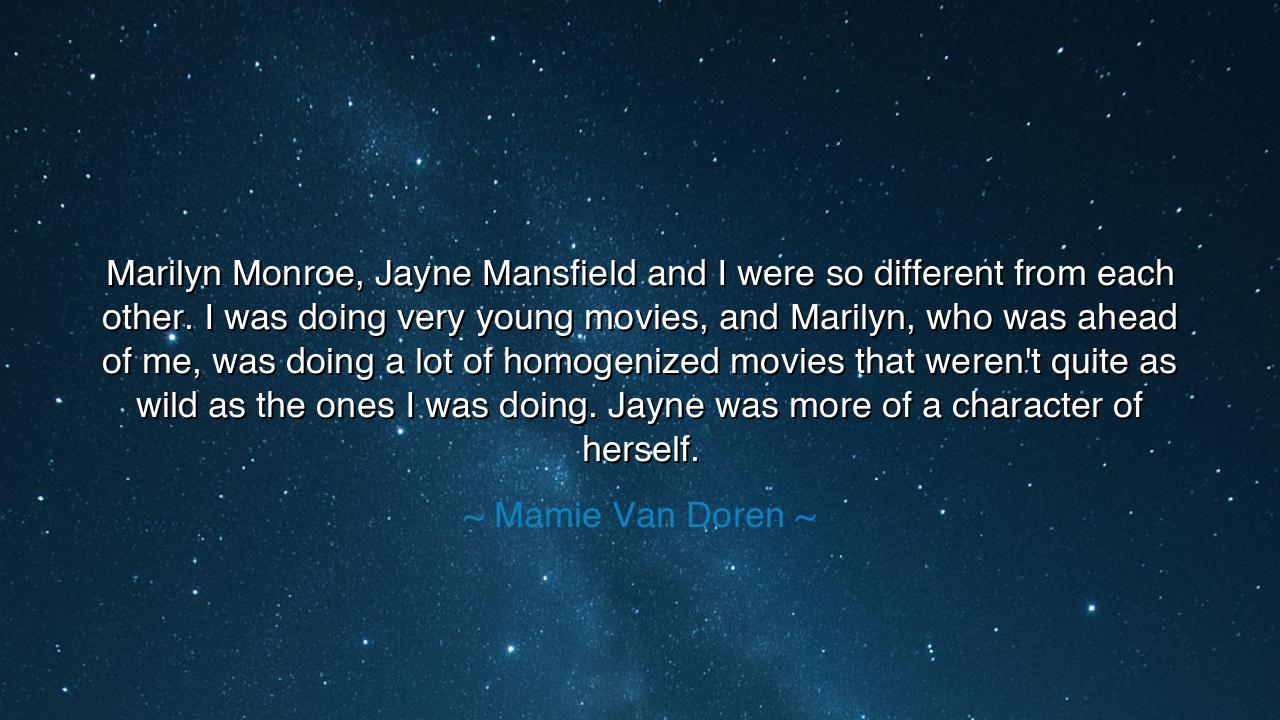
Marilyn Monroe, Jayne Mansfield and I were so different from
Marilyn Monroe, Jayne Mansfield and I were so different from each other. I was doing very young movies, and Marilyn, who was ahead of me, was doing a lot of homogenized movies that weren't quite as wild as the ones I was doing. Jayne was more of a character of herself.






Gather close, children, and listen well, for the words of those who have walked through the storms of life often hold deep wisdom about identity and expression. Mamie Van Doren, a figure whose life and career were marked by her distinct presence in the world of film, once said: "Marilyn Monroe, Jayne Mansfield, and I were so different from each other. I was doing very young movies, and Marilyn, who was ahead of me, was doing a lot of homogenized movies that weren't quite as wild as the ones I was doing. Jayne was more of a character of herself." In these words, Van Doren reflects on the differing paths taken by three iconic women in Hollywood, each with their own identity and approach to fame. Through her words, we are reminded that while the world may try to place us all in one mold, it is our individuality—our authenticity—that shapes our true legacy.
In the ancient world, heroes and goddesses were not defined by the expectations of others, but by their unique qualities and distinct paths. The Greek myths are filled with figures who, though often misunderstood by the society around them, stood firm in their truth. Consider the story of Athena, the goddess of wisdom and war. Though she was born from the head of Zeus, she was not like the other gods, for she was neither soft nor sentimental. Athena's path was one of strength and clarity, shaped not by the desires of others but by her own divine purpose. In the same way, Mamie Van Doren and her counterparts Marilyn Monroe and Jayne Mansfield were not defined by the roles they were offered, but by the ways they chose to present themselves—each of them embracing their individuality and expressing their truth in ways that were often misunderstood or undervalued.
Van Doren’s reflection on her career reveals the tension between authenticity and expectation. Just as Monroe navigated a world that demanded she fit into a more homogenized mold of femininity and sex appeal, Mansfield leaned into an exaggerated version of herself, a caricature that blurred the line between reality and performance. But Van Doren took a different path, seeking to bring a youthful exuberance and a sense of wildness to her roles—something that wasn’t confined by the typical expectations of beauty or behavior. The ancient philosophers would have recognized this tension, for Plato and Aristotle both warned of the dangers of conformity, encouraging individuals to seek the truth of their nature rather than simply following the crowd. In the same way, Van Doren’s expression of herself, unafraid to be different, speaks to a higher truth—the truth of individuality and authenticity.
Take, for example, the story of Socrates, who, despite the pressures of Athenian society to conform, chose to stand firm in his beliefs. He was ridiculed, mocked, and ultimately condemned to death, but Socrates remained true to himself, unwilling to compromise his integrity for the approval of others. His legacy endures not because he was popular, but because he was authentic. Similarly, Van Doren’s distinct path, though not always understood, became part of her legacy—not as a copy of someone else, but as a unique expression of her own essence. Monroe and Mansfield, though they too left their mark, were often bound by the expectations placed upon them by society. But Van Doren’s rebellion against those norms allowed her to stand out and make a lasting impression.
The lesson here, children, is that in a world that often seeks to place us into predefined roles and expectations, it is our authenticity—our ability to be true to our individual selves—that will define our legacy. The world may try to shape us into something we are not, but if we are strong in our truth and unwilling to compromise on our essence, we can carve out a space for ourselves that is uniquely ours. Just as Van Doren rejected the idea of being confined to a uniform image and instead embraced her own path, so too must we learn to stand firm in our own identity. The heroic path is not always the one of greatest fame or recognition; it is the one that aligns with your deepest truth.
In your own lives, children, know that you too will face pressure from the world to be like others, to conform to what is expected. But remember the wisdom of the ancients—the greatest power lies not in blending in, but in standing firm in your uniqueness. Just as Monroe, Mansfield, and Van Doren each carved out their own path in a world that sought to limit them, so too can you find your own voice, unafraid to be different, unafraid to be true to who you are. In this, you will find the strength and legacy that will endure, even when the world seeks to define you in ways that are not your own.
Children, take heart in the words of Van Doren and the lessons of the ancients. Embrace your uniqueness and let it guide you. The world may try to fit you into a mold, but you are not defined by the expectations of others. Your authenticity is your greatest strength, and by staying true to it, you will leave a mark on the world that is uniquely yours. Just as the heroes of myth stood out for their courage and their integrity, so too can you become a legend in your own right, defined not by the roles the world assigns you, but by the truth of who you are.






AAdministratorAdministrator
Welcome, honored guests. Please leave a comment, we will respond soon